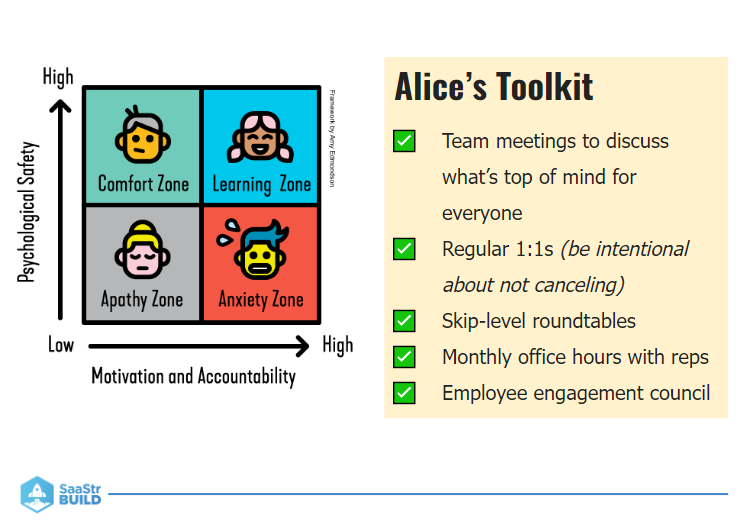“Success is the sum of small efforts repeated day in and day out.”
This famous quote from self-help author Robert Collier applies to every sales organization because excellent results come through repeatable activities, not one-off wins. Repetition and consistency in the small wins, however, are not possible when organizations fail to retain their talent.
Let’s look at some numbers:
- Number of job openings in December 2021: 12 million
- Number of people who quit their jobs in December 2021: 4.3 million
- The ratio of engaged vs. disengaged employees: 2:1
This period, often referred to as The Great Resignation, shows us how important it is to take measures to retain our employees. Alice Katwan, SVP at Twilio, discusses how you can build a high-retention sales team while being remote.
Key strategies to attract, nurture, and retain sales talent
-
Implement systems to attract great talent
One challenge Twilio faced was balancing the scaling efforts of the organization and building a world-class team to support their growth ambitions—in a virtual environment. However, the key to solving such a challenge was to have a solid system in place.
Here’s how you can find the right talent:
- Leverage your network: Reach out to your network and ask your team to do the same. Go through different degrees of separation to vet a candidate, find out their background, and assess if they would be a culture fit or have a successful track record. This will also allow the candidate to understand if they want to work in an organization like yours through the referee. It’s a win-win.
- Make diverse hires: This doesn’t just mean ethnic or gender diversity, but also geographic and skill diversity. Diversity will allow you to create a strong working team with people who think very differently from one another and who bring unique skill sets to the table.

-
Invest in your team’s development
Learn your team members’ ambitions and goals to understand what they want to do so you can provide them with ongoing training and feedback that is meaningful to them and in alignment with your business goals and their personal goals.
“It’s important for employees to own what they want to do and know where they want to go. Only when they own it can leaders mentor team members into achieving their goals.”
Focus on creating an environment of psychological safety in your organization so people have a sense of belonging and feel like they’re being heard.
At Twilio, Katwan connects with her team by:
- Sending a weekly email to her leaders to share what’s going on with the organization and what she’s prioritizing so they know what’s happening at her level.
- Have regular one-on-ones and roundtable discussions to listen to and understand the challenges her teams are experiencing.
- Organize bi-weekly office hours, which fill up quickly, and stir interesting conversations where team members get to know each other to form stronger relationships.
Twilio plans to launch an employee engagement council where team members from different levels of the organization can share their opinions and become the voice of the workforce so that the company can become more proactive, rather than reactive, in working through organizational challenges.

-
Create incentive programs that drive successful behaviors
Rewards motivate sales, so employee incentives hold a special place in a sales organization to reward the right behavior. For example, at Twilio, they’re shifting our focus from selling multiple products to selling software, so now they have multiple selling teams.
This makes it essential to identify the right behavior to reward, and base incentives on things that matter to your business and that’ll best motivate and engage your employees.
-
Be intentional about the culture you want to build
“How you make people feel is the key to building a successful organizational culture.”
One of the best ways to do culture-build is to invest time in making genuine connections with your people. For example, Katwan has three boys and regularly shares stories about her family with her team. Later, many of her team members follow up to ask about how her family is, which shows her they care. These connections go a long way in team-building and efficient cross-functional collaboration.
At Twilio, we regularly engage in team-building activities, such as happy hours. Recently, Katwan took her leadership team on an off-site trip to Napa. One of the key takeaways shared by her leaders was that they were able to get to know one another better, which instilled a greater sense of belonging.

Celebrate your small wins
Lastly, it’s important to celebrate success—big and small. Acknowledge accomplishments along the way, whether it’s recognizing your people’s typical behavior around closing deals or employees that embody your values.
“If leaders set the tone, it will trickle down within the organization. Little gestures of gratitude and intention will go a long way in creating a tremendous culture of success.”
Key takeaways
- Your brand matters—whether it’s hiring or retaining a candidate or the entire sales team in your organization.
- Leveraging your extended network is one of the best ways to cast a wide net and hire the right candidates for your available roles.
- Diversity matters—beyond gender and race, all the way to geographic and skill diversity.
- It’s important to encourage your teams to proactively take ownership of their career paths while providing them the mentorship they need to achieve what they want.
- Be intentional about the culture you want to build by keeping an open line of communication, being accessible, celebrating success, and leading with empathy.
- Reward the right behaviors and ensure they align with your business priorities.

